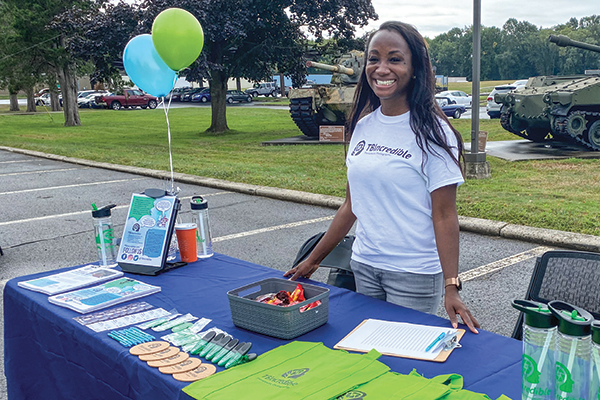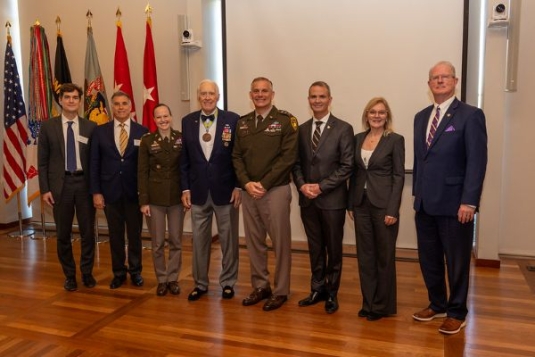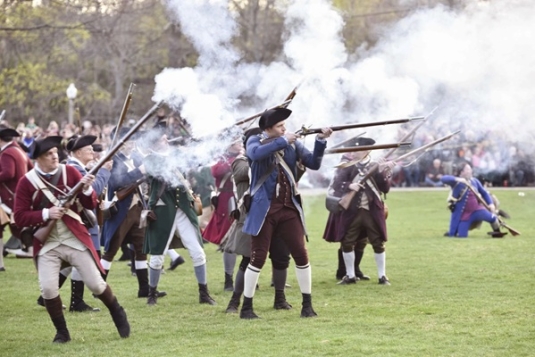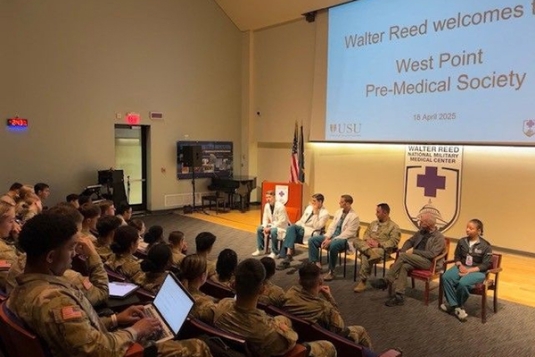By Keith J. Hamel, WPAOG staff
On March 27, 2009, then Cadet Jazmine Moore ’10 and a few of her classmates from Company B-2 were on their way back to the Academy from Camp Buckner when they heard a crash somewhere up on New York State Route 293.
Arriving at the scene, they saw a mangled mix of metal and broken glass. A smaller car was t-boned by a larger-size SUV. They reported the incident to Central Guard Room and watched as the jaws of life were used to cut the driver out of the car and as first-responders medevacked her to a hospital. Little did they know that the victim of this terrible accident was their own classmate, then Cadet Tanya Gauthier.
“I felt the history, the honor, and the sacrifice needed to come to the Academy and make it as a cadet.”
—Tanya Gauthier ’11
Gauthier entered West Point on June 26, 2006 with the Class of 2010. She remembers standing at a supply issue point in the Mess Hall on R-Day and looking up at the Poop Deck. “I stood in amazement at the sight,” she says. “I felt the history, the honor, and the sacrifice needed to come to the Academy and make it as a cadet.” And Gauthier did indeed make the most of it, participating in numerous clubs and activities and serving as one of the cadet managers for the Women’s Track and Field Team. She was also the first woman cadet to play on an intramural football team at West Point. “I was denied twice,” Gauthier says, “but I petitioned DPE and won.” Aside from cadet life, she also competed in the preliminary to the Miss New Jersey pageant, working with multiple officers to improve her interview skills and using her privileges to take ballet classes. On top of everything, she met Colonel Lynn Ray, the Engineer Branch Representative at the time and an Instructor of Military Science, who put Gauthier through brutal fitness training at Arvin Gym every morning. “Spring semester cow year, my plate was full,” she says. “I was enjoying my time at the Academy and living every minute of the day with purpose, stamina, and faith.”
When she arrived at the hospital after the accident, however, doctors only gave Gauthier hours to live. “Everything in my body was injured,” she says. “I had a collapsed lung, spinal fluid leakage, broken chest bones, broken facial bones, an eye completely blown out of its socket, blood vessel damage in my brain and neck, blood clots in my heart, nerve damage to my right arm, and traumatic brain injury.” When her classmates learned about her accident, they rushed to Westchester Medical Center, where it was standing room only in the waiting area that night. Once Gauthier was stable in the ICU, her best friend, then Cadet Christopher Clark ’10, was allowed to see her. Clark remembers seeing Gauthier lying unconscious, her body fully in bandages and her head wrapped tightly in a dressing, with a rod protruding from her skull to relieve pressure. Clark told Gauthier later that he could barely see life under the coverings.
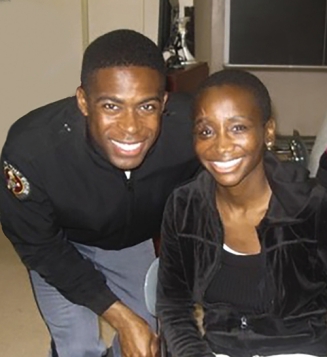
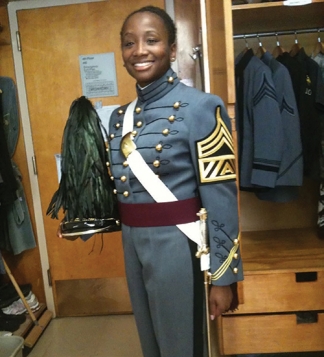
After spending two weeks in a coma, 30 days in the ICU, and “a lot of time” in the hospital, Gauthier was finally discharged. She then endured nine months of cognitive and physical therapy for eight hours a day. Despite every part of her aching and hurting, she was determined to finish what she had started at West Point. She made an appointment with the Dean, then Brigadier General Patrick Finnegan ’71, and entered his office wearing her baggy PT uniform (the only thing that fit her less than 100-pound body) and walking with a cane. Her face was lacerated with scars, her head was bald, and she had sores covering her body. As she did with DPE when she wanted to play intramural football, Gauthier passionately pleaded her case, requesting to return and complete her cadet career. When she finished, the Dean pointed to two folders on his desk and explained that they contained notes from meetings her course directors had had on her behalf while she was in the hospital. “The meetings detailed a game plan to help me upon my return,” Gauthier says. “Even when I was on my deathbed, my instructors continued to believe that I would come back with the same fight I had before I left.”
Her first step back was summer STAP for IT305. Fighting seizures, she “fell out twice.” After the second time, three of her professors encouraged her to take time off to heal. Gauthier left the Class of 2010 and struggled to assimilate to the Class of 2011, scrambling into a company she was not a part of for 18 months. When she returned to the Academy for a second time, she sought mentorship from then Colonel Bernard Banks ’87, Head of the Department of Behavioral Sciences and Leadership. She changed her major and resumed her academic career. She participated in class discussions and turned in assignments for high marks, but she struggled on tests, not being able to articulate her answers in the allotted time. Her instructors, in particular Colonel Donna Brazil ’83, worked with Gauthier individually. “Colonel Brazil showed patience, care, and Army values, boosting my esteem and helping me remember that I still had a fighting chance,” she says. Gauthier finished her course of studies and graduated with a degree in psychology and environmental engineering on January 17, 2012 during a ceremony that featured just her on the sixth floor terrace of the USMA Library. “I do not remember much of my time in the hospital after the accident, but one memory is the day I fought with the doctor who told me that I would never again go back to school, let alone return to West Point,” she says. “I lost contact with her, otherwise I would have invited her to my graduation!”

Yet, while she graduated, she would not be commissioned. Gauthier, whose goal upon entering the Academy was to branch Aviation, was medically discharged from the Army. “This destroyed me,” she says, but Gauthier vowed to make use of her West Point education, training, and sacrifice. She went to work for the state of New Jersey, and in 2020 decided to further serve her community by founding the nonprofit TBIncredible, which she is now looking to expand nationally. “I had been attending two support groups from brain-injured survivors: one military and one civilian,” Gauthier says. “The military group was able to attend sessions when needed; the civilian group struggled with insurance companies not paying for sessions, and I founded TBIncredible so that brain-injury survivors can recover without the fear of payments or the anxiety of meeting a deadline.” According to the CDC, 2.8 million cases of traumatic brain injury (TBI) occur each year, or 5.3 per minute. Also, according to studies by Veterans Affairs, approximately 414,000 service members were diagnosed with TBI between 2000-19. The mission of TBIncredible is to provide free support and help TBI survivors through therapeutic photography.
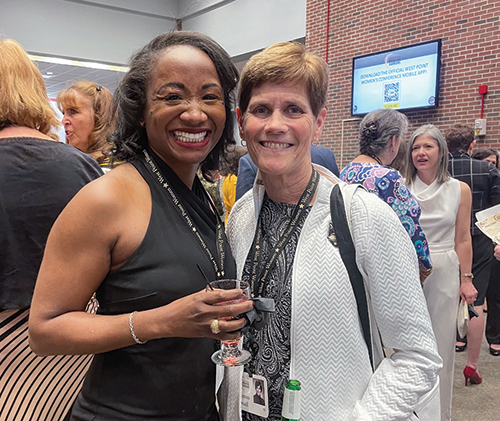
“I have found my purpose with TBIncredible. This is my baby, and I want it to be my legacy.”
—Tanya Gauthier ’11
“We hold photography workshops,” says Gauthier. “The premise behind this is to give survivors a new skill to learn, which helps rebuild synaptic connections.” Creating fellowship between TBI survivors in a judgement-free environment is an added bonus. The first TBIncredible event, which was held during the COVID pandemic, had 15 members. A virtual event reached 100 participants. Today, the goal is to gather 1,000-plus TBI survivors at an event.
“I have found my purpose with TBIncredible,” says Gauthier. “This is my baby, and I want it to be my legacy.” Through unwavering faith, love, and support, Tanya Gauthier has inspired countless others with her positive message of TBI awareness and recovery. “I applied to West Point to serve, wanting more than anything to proudly wear the uniform,” she says. By founding TBIncredible and executing its mission, Gauthier proves that “Duty, Honor, Country” is not the uniform one wears; it’s one’s heart (and brain, too!).
What do you think? Click here to answer 3 questions.

